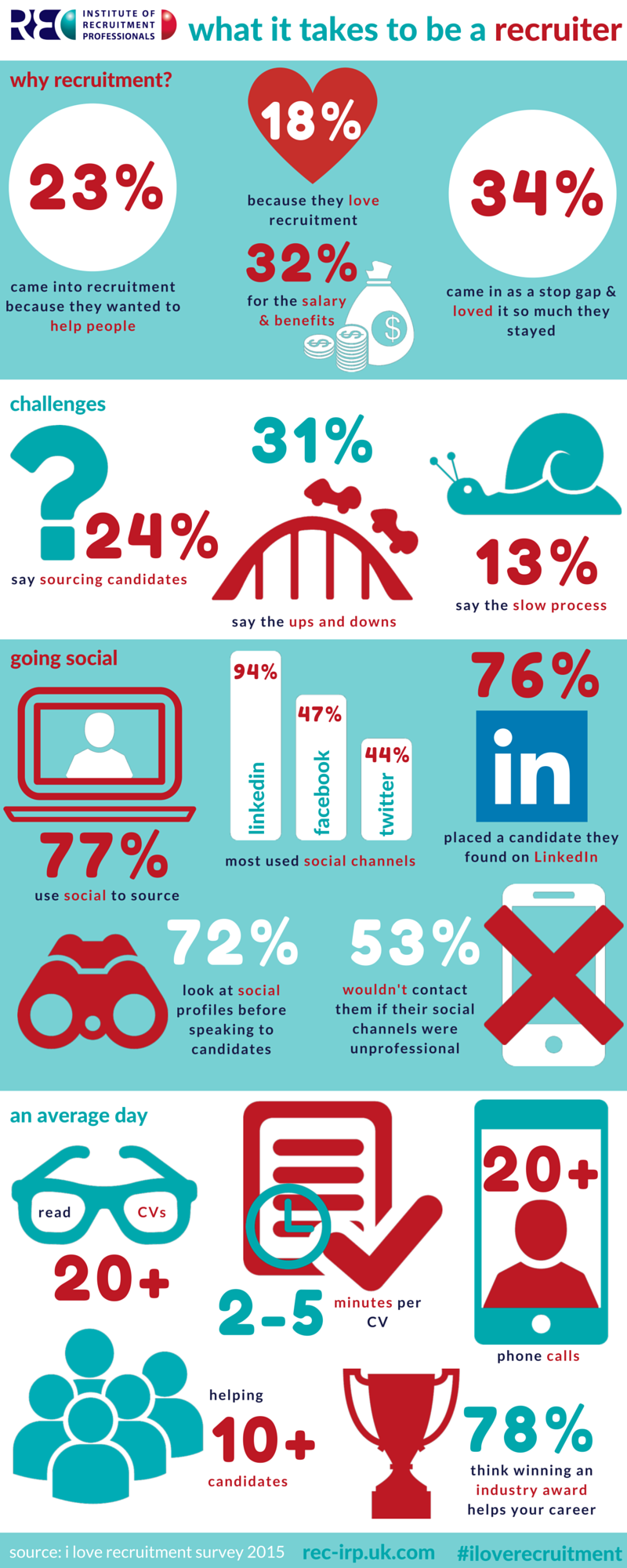The Results Are in - What Does It Take to Be a Recruiter?
Your recruitment career
Recently, we asked you to help us out with our annual survey, to give us a glimpse into your lives as recruiters.
Well, the results are in and you’ve given us some very interesting insights.
First things first…why did you decide to work in recruitment?
34% of you said you came into it as a stop gap and loved it – and no one said they still want to move on.
This is a very positive indicator.
Even if people are yet to commonly seek out recruitment as a career, once they’re in, they’re in.
Last week, students received their A-level results, and yesterday, GCSE results came out. Naturally, these students are now thinking of the next stage of their lives.
Are any of them thinking of recruitment as a career?
This is something we are working hard to achieve. We want recruitment to be a career of choice that’s considered by students coming out of school or university.
We saw 31% of respondents wanting to get into our industry because of the challenge it presents, and almost a quarter of respondents went into recruitment because they wanted to help people.
We definitely know that our industry is one full of challenges.
But what do you think the biggest challenge is?
31% of you said that the up and down nature of recruitment is your biggest challenge.
Recruitment is an industry where there are huge high points, but there are also low points which can knock you down. As ever, it’s how you respond to these ups and downs that makes your success.
One in four said that sourcing candidates is their biggest challenge. This is why expanding your sourcing strategy is now so important. We can’t just rely on candidates coming to us, and we need to think differently about how we source.
Our industry is booming, and the annual turnover is estimated to be £28.7 billion, with an 18% growth forecast over the next two years. So, it follows that sourcing competition will be heating up.
19% of you think that managing client and candidate expectations is the toughest challenge, and 13% said your biggest challenge is how slow the recruitment process can be.
Though highly rewarding, it is a challenge working with people. Clients may want CVs straight away, which isn’t always realistic, and once you’ve submitted a CV, your candidates may want feedback right away. Your challenge is juggling these expectations and making sure you’re not making false promises.
Recruitment really is a balancing act and it can be a challenge to keep everyone happy.
What did you say keeps you in recruitment?
Popular reasons you stay in the industry included ‘helping people find their dream job’ (32%), the thrill and competition (30%), the challenge (40%) and the salary and benefits (30%).
We can glean a lot from this. Recruitment is a challenging career for sure, but it’s one where the challenges are also the things that keep you coming back for more.
What do you get up to day to day?
80% of you meet one to five candidates in an average day. 7% of you meet six to ten and 7% meet over 10. That’s a lot of relationships you have to manage.
As well as this, more than half of respondents make over 20 phone calls in an average day, with a quarter making ten to fifteen calls. It’s easy to see why you are so busy!
40% are normally working on one to five roles at a time, with a further 33% working on upwards of five, and another 30% working on more than ten. When working on a lot of roles, naturally, you’ll be reading a lot of CVs.
But just how many? And how long do you spend reading them before moving on?
39% of you read over twenty CVs in an average day. Over half of you will spend two to five minutes reading a CV before moving on. Only one in ten will spend over six minutes.
Recruitment is a time sensitive job. As stated earlier, our industry is booming. We can see that it’s not the roles that are in short supply, but it’s the candidates. You are most often competing with other recruiters to try and find the perfect candidate for your role, which means you need to move quickly to turn it around and reach them first.
Check out the key findings from our survey in the below infographic, share it on your social channels and stay tuned for the next in our series of analyses – where we’re talking social recruiting - scheduled for release next week!

Share this article

